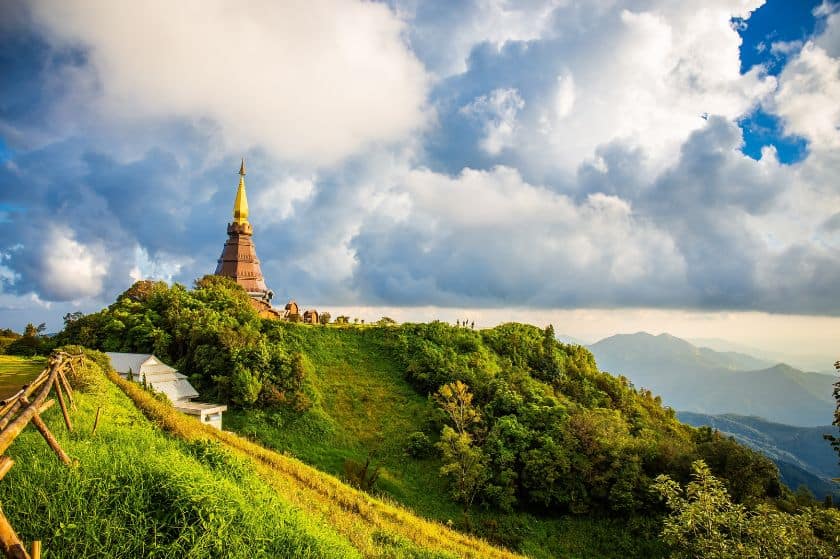
Chiang Mai is known as a top destination for “digital nomads,” but young, location-independent workers aren’t the only group who loves this Thai city. It’s also a popular spot for Western retirees.
The low cost of living, world-renowned cuisine, warm climate, and incredible travel opportunities are just a few of Thailand’s draws.
In this interview with Navy retiree, Josh, part of our Veterans Living Overseas Interview Series, learn why Chiang Mai is also the perfect place for motorcycle riding and golf, plus get the inside scoop on how to make the move to Thailand as a retiree.
Why did you move to Thailand and how did you choose Chiang Mai?
I came here first in 1989 on a short detachment from the Philippines, where I was stationed at the time. Thailand seemed a lot like the Philippines to my young self, so I wasn’t all that impressed.
Fast forward 40 years and I decided to come here on a vacation. I saw an entirely new aspect of this wonderful place. I was a big Anthony Bourdain fan and saw the episode where he came to Chiang Mai, so I decided to make a run up here and never left. That was 2018.
Chiang Mai is as modern a city as any could imagine. The crime is almost non-existent, the food is awesome and cheap, and the city is easy to get around if you can stand the traffic.
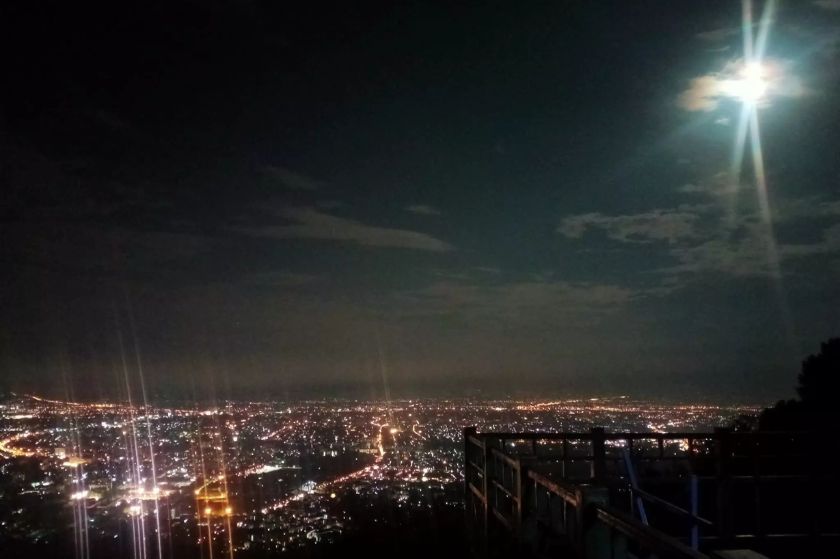
What type of residence visa do you have in Thailand?
There are multiple visa options here, but the best, by far is the retirement visa, aka “O-A” Visa.
You must be at least 50 years old and keep 800,000 Thai baht (around $24,000) in the bank unless you can establish that you have a guaranteed input of money into your account of 65,000 Thai baht ($1,900-ish) per month.
Note from Poppin’ Smoke: the Thai Embassy website lists the specific requirements for the O-A visa.
There are two options for a retirement visa: single and multi-entry. The multi-entry will cost a bit more, but it allows you to come and go as much as you want. I have the multi-entry because I ride my bike into Laos and Cambodia quite a bit, and I enjoy flying to Vietnam a couple times a year.
The problem with the single entry is if you travel outside the country during the year and try to come back, the visa gets kicked back to a tourist stamp (30 days) and you have to start the whole retirement visa process over again. Not insurmountable, but a pain, and it will cost you money and time.
Another possible option is a study visa. If anyone wanting to retire here still has GI Bill eligibility, there are a ton of universities here that accept it. The monthly housing allowance for full-time students at foreign universities is around $2,300 per month, which is a ton of money in Thailand. There are two universities here in Chiang Mai that offer programs and there are probably 30 or more in various other places around the country.
| Related Reading: Visa Options for Veterans Moving Overseas
All foreigners living in Thailand must do 90-day check-ins. You’re just letting immigration authorities know where you live and that you are still in the country. You can do the check-ins online and it only takes a few minutes.
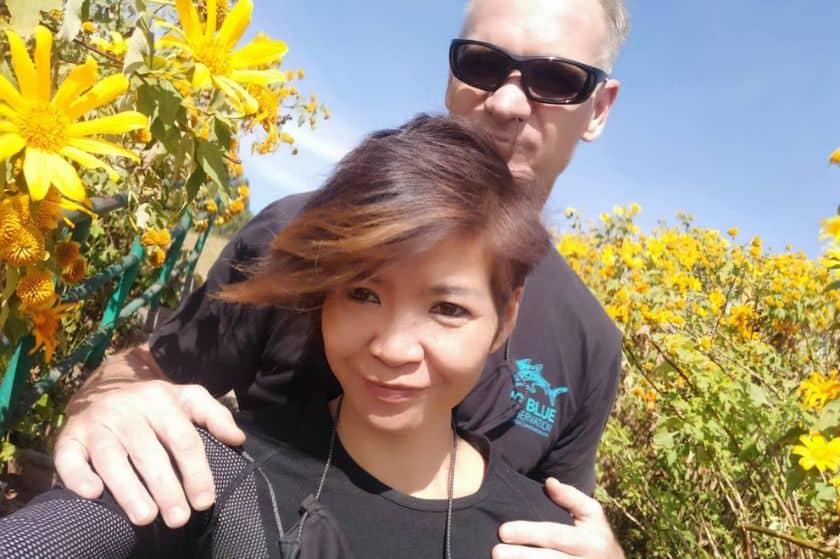
The Thais take immigration, and especially illegal immigration, very seriously, so don’t mess around with that. I’ll mention it below, but I highly recommend anyone who wants to live in Thailand hire an agent that will take care of that sort of thing for you.
Do you speak Thai? If not, is it difficult to navigate daily life?
The language is very tough to learn, and outside the city, hardly anyone speaks English.
This is challenging at first, so anyone planning to live here long term would do well to start off living in the city until you get the hang of things. Now I live about 10 kilometers outside the city and have no problems at all.
Learn to count, say “hello,” and ask where the bathroom is, and dust off your charades skills and you can get anything you need done. Google translator and having a girlfriend fluent in English (like mine is) doesn’t hurt, either.
How does the cost of living in Thailand compare to the U.S.?
Rent is super cheap, and you can get basically a mansion outside the city for under $1,000. I pay $250 a month, including wifi, for a small house.
My electric bill is about $30 on hot months (air conditioner), and water is practically free. A single person could live in a beautiful, spacious house for about $500/month. A budget of $1,500-3,000 per month total will get you a very comfortable life in Thailand.
It’s hard to find Western-type grocery items here unless you want to pay through the nose. For example, a large Jif peanut butter will run you about $9 at the store specializing in Western products. But, local foods, veggies, fruits–market type stuff–is cheap and very abundant.
Gas. Now that is NOT cheap here. It’s running about $1/liter or $4/gallon. I personally don’t own a car here and probably never will. You really don’t need one, in my opinion, and they are a pain in the city, anyway.
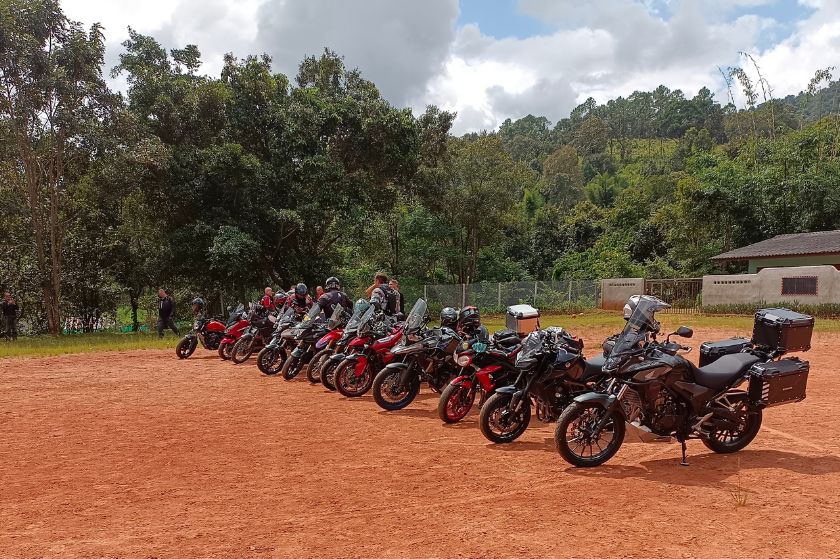
I have my motorcycle and a scooter that I ride every day. It’s a little Honda Click 125 that gets me about 90 miles to a gallon and I can fill it up for about $5. The big bike (Honda 500X) costs around $15 to fill and gets me in the neighborhood of 500kms/tank.
Tell us about the health care. Do you have a local insurance plan?
I use TRICARE Overseas Select. There are a plethora of health plans available here but some are pricey.
TRICARE works great, but you pay out of pocket, then get reimbursed after the fact. So, that may be an issue for some.
| Related Reading; How to Use TRICARE Overseas
If you’re on a retirement visa, you must keep 800,000 Thai baht in the bank anyway, and that will cover just about anything you may need medical-wise. Then, just submit a claim to TRICARE and they pay you back.
I would recommend that anyone who decides to live in Thailand get the upgraded insurance when you pay tax on your vehicle. The most likely thing that’s going to affect a normally healthy individual, especially a motorcyclist, is a traffic accident. So, spending the extra $50 or so a year for the upgraded insurance will cover most of the expenses you may have if you get into an accident.
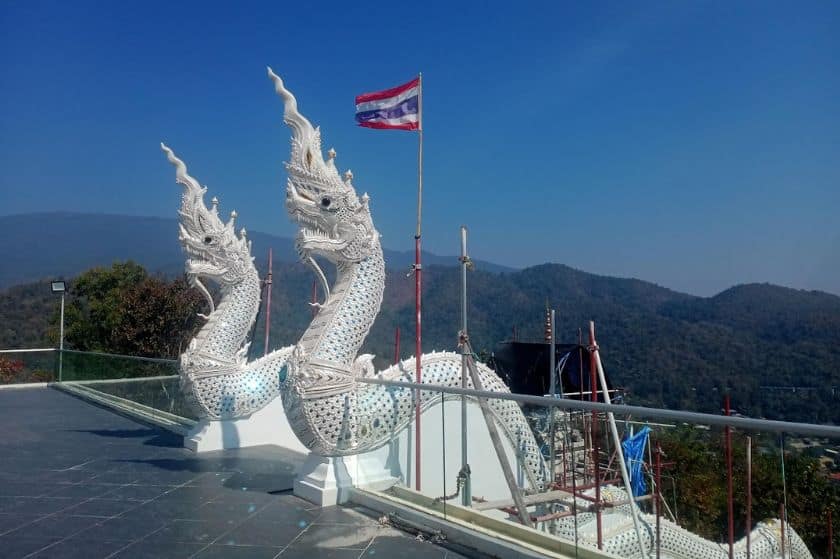
Dental care in Thailand is top notch and very inexpensive. Ditch your dental insurance and just pay out of pocket if you need something done.
I flew my son here a few months back to get three fillings fixed, a root canal, a cleaning and a whitening, and the total dental bill was just shy of $300. The plane ticket, lodging, and dental care was less that what he would have had to pay in the States for just the dental care. By contrast, I was paying $175 per month for TRICARE dental when my son was in high school.
I got a laser whitening/cleaning in Bangkok – from a dentist that went to UCLA dental school, by the way – for about $200. I get an annual cleaning and check-up that costs me around $30.
Does Thailand tax your military retirement?
No. There is an agreement between Thailand and the US that they will not tax you on money that your home country has already taxed.
(Note from Poppin’ Smoke: you can read the U.S. – Thailand tax treaty on the IRS website.)
Is there anything you wish you had known or done differently prior to moving to Thailand?
I wish I had moved here much earlier. I also wish I would have known to hire an agent right when I got here.
Thailand is such a different place culturally than the States, that it’s hard to know what to even ask before you get here.

The one thing that I’m glad I did before coming here was get rid of all my material crap that I had in the States. I basically started over. I sold/gave away almost all my possessions before I moved here and arrived with two duffle bags and a backpack.
I also came here debt-free, which is a huge thing. To anyone thinking of retiring in Thailand, or anywhere overseas, get rid of your debt and your crap. Material things are like an anchor.
Tell us about daily life in Thailand. How do you spend your time?
My personal hobbies here are motorcycle riding and golf, both of which are world class, especially up in the north.
Thailand is a motorcyclist’s paradise, both on and off road, with some of the most challenging and beautiful roads one can imagine. And, while there are loads of traffic laws, they are rarely enforced. Unless one is in the city without a helmet or in an accident, your likelihood of ever even interacting with a cop is about zero.
One could easily–as I have done many times–disappear on a bike for two to three weeks and never see the same road twice and have the motorcycle adventure of a lifetime.
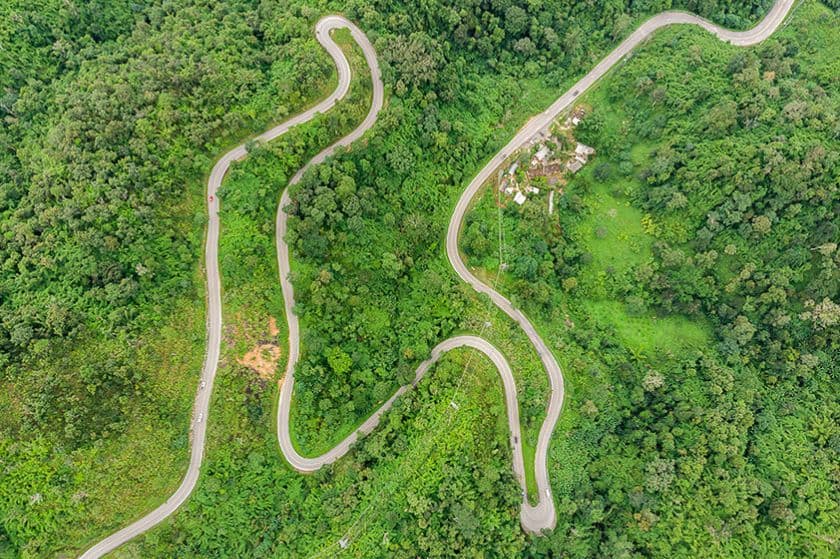
And that’s just Thailand. it’s pretty easy to get a local bike into Laos, and that’s a whole ‘nother level of two wheeled adventure.
Golf here is about the same. Epic! You can have everything from a Tiger Woods-designed hot spot to beautiful little local courses like the one me and my bros play most of the time.
Green fee: $15. Bag of balls: $3. Large beer: $2. Caddie (optional): $3 + tip. I’ll spend, on average, about $50/week and play anywhere from 36 to 72 holes. It’s fantastic.
I like to work out as well and belong to a gym that is as nice a facility as I’ve ever been to in the 40 years I’ve been working out. It costs about $30 a month and has state of the art equipment and a 25 meter pool. There are far cheaper gym options here as well.
The cities and larger villages in Thailand have anything you could ever need or want. Restaurants are everywhere, stores that sell anything you could possibly need are abundant, and malls—if you’re into that—are incredible here.
It’s very similar to the West in the shopping realm. Makro is the Thai version of Costco and has anything, in bulk, you could ever need. There are super fancy, high-end grocery stores here that sell anything (at a higher price) you can get in a Safeway, Ralph’s or other American grocery store.
Public transport is abundant and very cheap. The Thai version of Uber is called, “Grab” and you can go 10-ish kilometers for about $5. They have taxis, the “red trucks” that cost almost nothing, and “tuk tuks” to get around the city.
Do you have many friends from the local population, or do you primarily socialize with other expats?
I’ve heard there are heaps of fellow Americans here, I just haven’t met many. My best friends here are an Australian and a Kiwi (New Zealander). I also have a bunch of Brits, a couple of Italians, a lone Frenchman, and of course, some Thais.
I have an American buddy I ride with, but he splits his time between here and the States, so I don’t see him much. And I know a retired Marine, but he lives pretty far away, so I only see him once in a while. No matter where they are from, the expat community are, all in all, a solid bunch.

The most important person here is my lady, Angkana. Born and raised in northern Thailand, she owns a coffee shop and is a tour guide (motorcycle lead rider guide). She’s in her mid forties, looks 25, speaks fluent English, and is about the most wonderful thing I’ve ever had in my life.
Do you feel “accepted” in the local community? If not, why?
I live outside the city these days, and I feel like I’m sort of like an interesting pet to the people in my village. They are all very nice and they are all interested in what I’m doing, but they are not overly friendly. They smile, treat me with respect, and wave. I’m just not one of them, and I feel that.
When I was living in the city, I was just another farang (Westerner/tourist), and all the places I used to frequent were very nice and just treated me like a visitor. I’ve never had any issue in a negative way with a local. Very nice people here.
What are some of the challenges of living in Thailand?
The traffic is pretty horrendous, and Thailand has one of the highest per capita road death rates in the world. But, if you don’t pour 10 beers down your throat, ride like a maniac with no helmet, and keep your speed down, it’s not that big of a deal.
Just be ready to deal with people doing completely stupid and unpredictable things on the road. Oh, and they drive on the left in Thailand.
(Think you’ve found your next home overseas? Answer these 24 questions before you make the move.)
The language is very difficult for Westerners since we don’t speak in “tonal” languages. So, one will be speaking very broken Thai while most Thais speak very broken, at best, English.
But fear not, it’s easy to live and get anything you want/need here. Learn to count, learn to ask where the bathroom is, and how to say “thank you,” and you’ll be fine. Especially in cities like Bangkok or Chiang Mai, a basic understanding of English is pretty common. Particularly in the tourist areas, so you can get by pretty easily.
What advice would you give to anyone who is thinking of moving to Thailand?
The visa process here is, shall we say, complicated. So, my #1 recommendation for anyone planning to live here long term is to hire an “agent.” Finding an agent is a pretty easy internet search or you can ask around once you get here.
These angels–most of the agents seem to be women for some reason– are absolute life savers. They can help with just about anything you need, from visa issues, driver’s licenses, DMV type stuff, questions answered, translation, etc. I pay mine about $400 a year and I spend 30 minutes per year on immigration. I’ve had no issues in that regard whatsoever.
If you’re over 50 and can stick about $24,000 in the bank for a period of time, the “retirement” visa is the way to go. Once you get established, just transfer at least 65,000 Thai baht ($1,900ish) per month, and you don’t have to keep a gob of money in the bank. Again, a good agent can walk you through all of that.
Also, I would highly recommend to anyone who is thinking about living here to come for a visit first. Start off in Bangkok for a week or so, come up here to Chiang Mai for a week or so then maybe go over to Issan (eastern part of the country) for a week and get a sense of what life is like here.
If you have questions, you can contact me: ryder_moore@proton.me.
What are your longer-term plans? Do you intend to in Thailand for the foreseeable future?
I plan to stay here for the rest of my life.
* * *
Interested in life in Thailand?
If Thailand is on your short list of potential places to move, get another perspective from a retiree who lives there 6 months per year.
Also, take Josh’s advice and visit different parts of Thailand before zeroing in on a location. Spending a week or two in each spot will help you narrow it down.
If you find a place you like, we also recommend renting an apartment there and spending at least a month or more trying to experience life as a local. This is an important investment of time and money that can help you avoid costly mistakes!
Still exploring other countries besides Thailand? Check out the rest of our Veterans Living Overseas interviews. Also, if you’re a member of the U.S. military community, join our Facebook group to exchange advice, experiences, and information about living in a foreign country as a civilian.
Finally, before you move to any foreign country, make sure you’ve done your research and can answer these important questions about your potential new home!
